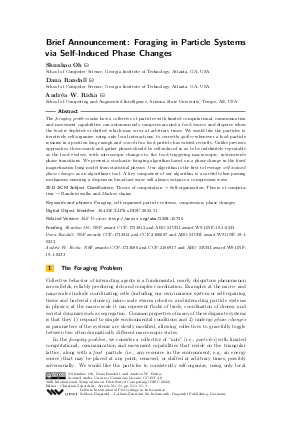Brief Announcement: Foraging in Particle Systems via Self-Induced Phase Changes
Authors Shunhao Oh, Dana Randall, Andréa W. Richa
-
Part of:
Volume:
36th International Symposium on Distributed Computing (DISC 2022)
Part of: Series: Leibniz International Proceedings in Informatics (LIPIcs)
Part of: Conference: International Symposium on Distributed Computing (DISC) - License:
 Creative Commons Attribution 4.0 International license
Creative Commons Attribution 4.0 International license
- Publication Date: 2022-10-17
File

PDF
LIPIcs.DISC.2022.51.pdf
- Filesize: 417 kB
- 3 pages
Document Identifiers
Related Versions
- Full Version http://arxiv.org/abs/2208.10720
Subject Classification
ACM Subject Classification
- Theory of computation → Self-organization
- Theory of computation → Random walks and Markov chains
Keywords
- Foraging
- self-organized particle systems
- compression
- phase changes
Metrics
- Access Statistics
-
Total Accesses (updated on a weekly basis)
0PDF Downloads0Metadata Views
Abstract
The foraging problem asks how a collective of particles with limited computational, communication and movement capabilities can autonomously compress around a food source and disperse when the food is depleted or shifted, which may occur at arbitrary times. We would like the particles to iteratively self-organize, using only local interactions, to correctly gather whenever a food particle remains in a position long enough and search if no food particle has existed recently. Unlike previous approaches, these search and gather phases should be self-induced so as to be indefinitely repeatable as the food evolves, with microscopic changes to the food triggering macroscopic, system-wide phase transitions. We present a stochastic foraging algorithm based on a phase change in the fixed magnetization Ising model from statistical physics: Our algorithm is the first to leverage self-induced phase changes as an algorithmic tool. A key component of our algorithm is a careful token passing mechanism ensuring a dispersion broadcast wave will always outpace a compression wave.
Cite As Get BibTex
Shunhao Oh, Dana Randall, and Andréa W. Richa. Brief Announcement: Foraging in Particle Systems via Self-Induced Phase Changes. In 36th International Symposium on Distributed Computing (DISC 2022). Leibniz International Proceedings in Informatics (LIPIcs), Volume 246, pp. 51:1-51:3, Schloss Dagstuhl – Leibniz-Zentrum für Informatik (2022)
https://doi.org/10.4230/LIPIcs.DISC.2022.51
BibTex
@InProceedings{oh_et_al:LIPIcs.DISC.2022.51,
author = {Oh, Shunhao and Randall, Dana and Richa, Andr\'{e}a W.},
title = {{Brief Announcement: Foraging in Particle Systems via Self-Induced Phase Changes}},
booktitle = {36th International Symposium on Distributed Computing (DISC 2022)},
pages = {51:1--51:3},
series = {Leibniz International Proceedings in Informatics (LIPIcs)},
ISBN = {978-3-95977-255-6},
ISSN = {1868-8969},
year = {2022},
volume = {246},
editor = {Scheideler, Christian},
publisher = {Schloss Dagstuhl -- Leibniz-Zentrum f{\"u}r Informatik},
address = {Dagstuhl, Germany},
URL = {https://drops.dagstuhl.de/entities/document/10.4230/LIPIcs.DISC.2022.51},
URN = {urn:nbn:de:0030-drops-172423},
doi = {10.4230/LIPIcs.DISC.2022.51},
annote = {Keywords: Foraging, self-organized particle systems, compression, phase changes}
}
Author Details
Funding
- Oh, Shunhao: NSF award CCF-1733812 and ARO MURI award W911NF-19-1-0233
- Randall, Dana: NSF awards CCF-1733812 and CCF-2106687 and ARO MURI award W911NF-19-1-0233
- Richa, Andréa W.: NSF awards CCF-1733680 and CCF-2106917 and ARO MURI award W911NF-19-1-0233
References
-
Sarah Cannon, Joshua J. Daymude, Dana Randall, and Andréa W. Richa. A Markov chain algorithm for compression in self-organizing particle systems. In Proceedings of the 2016 ACM Symposium on Principles of Distributed Computing, PODC '16, pages 279-288, 2016.

-
Shengkai Li, Bahnisikha Dutta, Sarah Cannon, Joshua J. Daymude, Ram Avinery, Enes Aydin, Andréa W. Richa, Daniel I. Goldman, and Dana Randall. Programming active granular matter with mechanically induced phase changes. Science Advances, 7(17):eabe8494, 2021.

